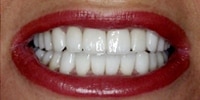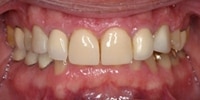In a healthy mouth, an overbite of 10% of the upper teeth over the lower teeth is natural. Anything more than that increases the likely hood that your bite is unhealthy.

HEALTHY BITE

OVERBITE
Deep overbites mean the lower jaw must stay back from a more natural position so that the upper and lower teeth can mesh together. This is most often caused by the upper dental arch being too narrow for the lower dental arch being able to fit where it is most natural and comfortable and instead forcing the lower jaw backward.
A narrow palate also forces the tongue to spread out between the upper and lower back teeth, which limits their eruption and allows them to tip inward, then the muscles must overclose and pull the lower jaw backward to fit the short back teeth together in the overclosed retruded overbite position.
Overbites not only create muscle tension but also compress the jaw joint into an unhealthy position. Some of the most advanced jaw joint erosion and disease is in patients with a deep overbite.
